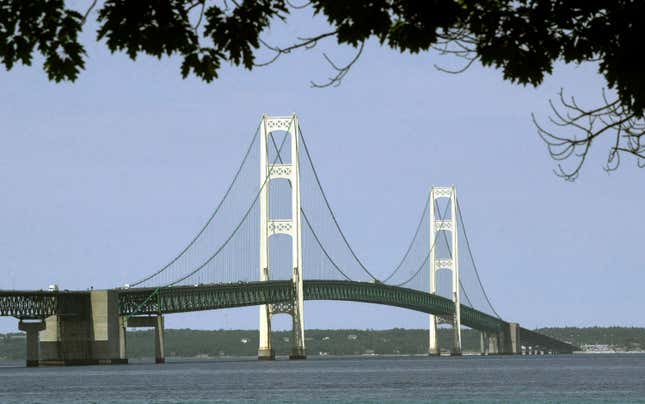
Michigan officials approved a $500 million plan Friday to encase in a protective tunnel a portion of an aging oil pipeline that runs beneath a channel connecting two Great Lakes, leaving just one more regulatory hurdle for the contentious project.
The state's three-person Public Service Commission approved the project in the Straits of Mackinac on a 2-0 vote. Commissioner Alessandra Carreon abstained, noting she just joined the commission four months ago.
The commission's chairperson, Dan Scripps, said the tunnel is the best way to mitigate the risk of a spill as the state slowly transitions to renewable energy sources.
“An oil spill in the straits would be, in a word, catastrophic,” he said.
Opponents lined up in front of the commission to complain after the vote, blasting the project as a boondoggle that will lock the state into using fossil fuels even longer and endanger the environment.
The plan still needs approval from the U.S. Army Corps of Engineers, which is still compiling an environmental impact statement. A final decision may not come until 2026.
Enbridge Energy has been operating the Line 5 pipeline since 1953. The pipeline moves up to 23 million gallons (87 million liters) of crude oil and natural gas liquids daily between Superior, Wisconsin, and Sarnia, Ontario.
A 4-mile (6-kilometer) portion of the pipeline crosses the bottom of the Straits of Mackinac. After an Enbridge pipeline leaked about 21,000 gallons (79,500 liters) of crude oil into a Kalamazoo River tributary in southern Michigan in 2010, the state formed a task force to review petroleum pipelines across the state, including Line 5.
Enbridge officials revealed in 2017 that engineers had known about gaps in Line 5's protective coating in the straits since 2014. That section of pipeline was also damaged by a boat anchor in 2018, raising concerns about a spill. Later that year, then-Republican Gov. Rick Snyder's administration reached an agreement with Enbridge calling for the company to build a tunnel 60 to 375 feet (18 to 114 meters) beneath the lakebed to house a new section of Line 5 and shut down the existing segment at a cost of $500 million.
Opponents attending Friday's vote expressed their anger at the commission's approval of the project.
“I am disgusted with your vote,” said Andrea Pierce, who works with the Michigan Environmental Justice Coalition and is a member of the Little Traverse Bay Bands of Odawa Indians, which opposes the project. “Seriously, you are supposed to protect the Great Lakes and protect us. I think what you’ve done here is completely and utterly negligent."
No Enbridge officials spoke at the meeting. Enbridge Senior Vice President and Chief Communications Officer Mike Fernandez said in a telephone interview after the meeting concluded that the company was pleased with the commission's decision and called it a “great step forward.”
He stressed that replacing the section of pipeline under the straits and encasing it in a tunnel buried dozens to hundreds of feet below the lakebed creates two new layers of protection. He added that demand for oil and propane may recede as the country moves toward renewable energy sources but it won't end because oil is needed to produce plastics used in computers, handheld devices and medical devices.
Current Gov. Gretchen Whitmer, a Democrat, has said she opposes the continued operation of Line 5 under the straits — even with the new tunnel — agreeing with Indigenous tribes, environmentalists and tourist businesses that it is at risk of causing a devastating spill.
She ordered Enbridge in November 2020 to close the 68-year-old line, revoking a 1953 state easement allowing its placement in the straits. Enbridge, based in Calgary, Alberta, contends the line is safe and ignored the governor’s shutdown deadline.
Democratic Attorney General Dana Nessel filed a state lawsuit in 2019 to void Enbridge's easement in the Straits. A federal appellate court is reviewing whether the lawsuit belongs in state or federal court.
The state Department of Environment, Great Lakes and Energy in 2021 approved construction of the tunnel. Liesl Clark, who was the director of the Michigan agency at the time and a Whitmer appointee, said the company’s application satisfied state legal requirements.
A federal judge in Madison, Wisconsin, this summer gave Enbridge three years to shut down part of Line 5 that runs across the reservation of the Bad River Band of Lake Superior Chippewa.
The tribe sued Enbridge in 2019 to force the company to remove about 12 miles (19 kilometers) of pipeline crossing its reservation, saying the pipeline is prone to spills and land agreements allowing it to operate on reservation land expired in 2013.
The company has proposed a 41-mile (66-kilometer) reroute of the pipeline to end its dispute with the tribe. It has appealed the shutdown order to the 7th U.S. Circuit Court of Appeals; the case is still pending.
___
This story has been updated to correct that the Enbridge Energy Line 5 pipeline operates between Superior, Wisconsin, and Sarnia, Ontario.